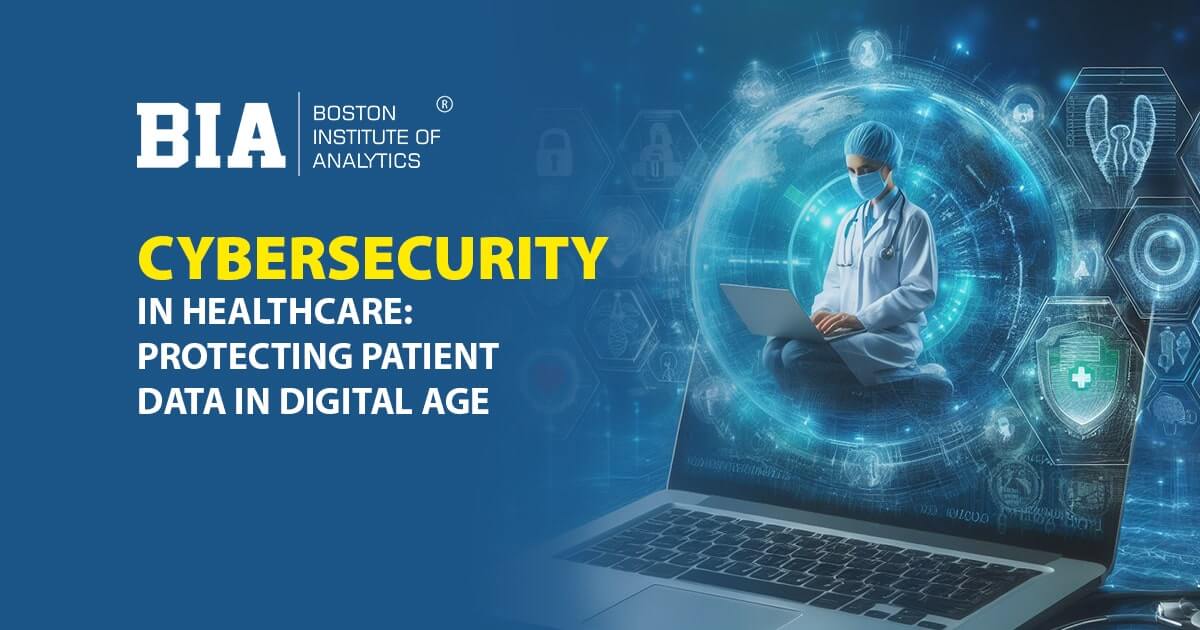Cybersecurity in HealthCare: Protecting Patient Data in Digital Age
The healthcare industry is undergoing a digital revolution. Patient records are transitioning from paper to electronic health records (EHRs), medical devices are becoming increasingly interconnected, and telehealth services are rapidly expanding. While these advancements offer undeniable benefits, they also create a critical vulnerability: a vast landscape of interconnected systems brimming with sensitive patient data. This makes the healthcare sector a prime target for cybercriminals, turning cybersecurity into a matter of life and death.
Cybersecurity in healthcare is a critical concern as the industry increasingly relies on digital systems to store and manage patient data. The sensitive nature of healthcare information, including personal and medical records, makes it a prime target for cyberattacks. Healthcare organizations face challenges in securing their systems against threats such as ransomware, phishing attacks, and data breaches. Additionally, the rapid digitization of healthcare services, including telemedicine and electronic health records, has expanded the attack surface, making it more challenging to ensure the security and privacy of patient data. As such, healthcare providers must implement robust cybersecurity measures to protect patient information and maintain trust in the healthcare system.

Importance of Cybersecurity in Healthcare
Unlike a data breach in the retail sector, a cyberattack on a healthcare provider can have far more devastating consequences. Here’s why cybersecurity is paramount in the healthcare industry:
- Protecting Sensitive Patient Data: EHRs contain a wealth of personal information, including medical history, diagnoses, medications, and even genetic data. A data breach can lead to identity theft, discrimination based on medical conditions, and even endanger patients undergoing treatment for sensitive conditions.
- Disruption of Critical Services: Hospitals and clinics rely heavily on technology for patient care. Cyberattacks can disrupt these systems, leading to delays in diagnoses, cancellations of surgeries, and even the potential for life-threatening situations. Implementing robust cybersecurity in healthcare is crucial to defending patient data from emerging digital threats. The evolution of cybersecurity in healthcare aims to stay one step ahead of hackers, ensuring the safety of electronic health records.
- Public Health Risks: Healthcare systems manage vital public health data related to outbreaks and epidemics. Cyberattacks compromising this data can hinder disease control efforts and put entire communities at risk. Training healthcare professionals in cybersecurity measures is a vital step toward safeguarding patient information in the digital age.
- Financial Repercussions: Healthcare organizations face hefty fines for HIPAA violations in the event of a data breach. Additionally, they may incur costs associated with data recovery, reputational damage, and litigation. Cybersecurity in healthcare not only protects patient data but also secures the technology that supports life-saving medical devices.
The Evolving Threat Landscape
Cybercriminals targeting the healthcare sector are constantly innovating. Here’s a glimpse into the most prevalent threats:
- Ransomware: This crippling malware encrypts data, rendering it inaccessible until a ransom is paid. Ransomware attacks can cripple hospital operations, delaying critical care and putting lives at risk.
- Phishing Attacks: These deceptive emails or messages attempt to trick healthcare staff into revealing sensitive information or clicking malicious links that can infect systems with malware.
- Supply Chain Attacks: Cybercriminals may target third-party vendors used by healthcare providers to gain access to their systems and ultimately reach patient data.
- Internet of Medical Things (IoMT) Vulnerabilities: Medical devices like pacemakers and insulin pumps are increasingly connected to the internet, creating new attack vectors for hackers to disrupt critical medical functions.
“Cyberattacks, cyber threats, and attitudes toward cybersecurity policies” published in the Journal of Cybersecurity explores how exposure to cyberattacks influences public support for intrusive cybersecurity policies. It also investigates the mediating role of threat perception in this relationship. The study highlights the impact of different types of cyberattack exposure on support for various regulatory policies. The integration of advanced cybersecurity in healthcare protocols in healthcare settings minimizes the risk of data breaches and maintains patient trust.
“A systematic literature review of how cybersecurity-related behavior impacts organizations” by Emerald Insight investigates cybersecurity attacks on critical infrastructures, businesses, and nations. It sheds light on the rising interest in cybersecurity and its impact on mainstream media and public consciousness. Investing in cybersecurity in healthcare is essential for complying with legal and ethical standards for patient data protection. Through cybersecurity in healthcare, institutions are fortifying their defenses against ransomware attacks that threaten patient privacy.
Creating Strong Cybersecurity Protection
The healthcare sector needs a multi-layered approach to combat cyber threats:
- Strong Network Security: Firewalls, intrusion detection/prevention systems (IDS/IPS), and data encryption are essential tools to monitor network traffic and prevent unauthorized access.
- Data Security Protocols: Healthcare providers must implement data access controls, such as role-based access and multi-factor authentication, to ensure only authorized personnel can access sensitive data.
- Regular Security Assessments: Regular vulnerability scans and penetration testing can identify weaknesses in systems before cybercriminals exploit them.
- Comprehensive Backups and Disaster Recovery Plans: Data backups and a robust disaster recovery plan ensure quick restoration of systems and minimize downtime in the event of an attack.
- Security Awareness Training: The human element remains a critical vulnerability. Regular training for staff on cybersecurity best practices, including phishing email identification and password hygiene, can significantly reduce the risk of successful attacks.
Regulations and Compliance
The Health Insurance Portability and Accountability Act (HIPAA) mandates healthcare providers to protect patient data. Organizations must comply with HIPAA’s Security Rule, which outlines standards for safeguarding electronic protected health information (ePHI). Additionally, industry bodies publish best practices and guidelines to help healthcare organizations strengthen their cybersecurity posture. Adopting cutting-edge cybersecurity solutions in healthcare environments ensures the integrity and confidentiality of patient records.
The Road Ahead: Collaboration for a More Secure Future
Combating cyber threats requires a collaborative effort. Healthcare providers, government agencies, technology vendors, and cybersecurity experts must work together to share information about threats, develop comprehensive security strategies, and invest in research and development of next-generation security solutions. The collaboration between IT experts and medical professionals is key to developing effective cybersecurity strategies in healthcare. The collaboration between IT experts and medical professionals is key to developing effective cybersecurity strategies in healthcare. Enhancing cybersecurity in healthcare is imperative for the seamless operation of telemedicine services and the protection of remote patient interactions.
The future of healthcare hinges on robust cybersecurity. By prioritizing data protection, fostering a culture of cybersecurity awareness, and embracing continuous improvement, the healthcare industry can create a safe and secure environment for patients, providers, and the entire healthcare ecosystem. Enhancing cybersecurity in healthcare is imperative for the seamless operation of telemedicine services and the protection of remote patient interactions. Implementing robust cybersecurity in healthcare is crucial to defending patient data from emerging digital threats.
Jobs in Cybersecurity in Healthcare
Jobs in cybersecurity in healthcare are in high demand as the industry faces increasing threats to patient data security. Roles such as cybersecurity analysts, IT security managers, and compliance officers are essential for ensuring that healthcare organizations comply with regulations and protect sensitive information. These professionals play a crucial role in implementing security measures, monitoring systems for breaches, and responding to cyber incidents. With the growing reliance on technology in healthcare, the need for skilled cybersecurity professionals is expected to continue to rise, making it a promising career path for those interested in protecting healthcare data and systems.

Sources : Indeed
Roadmap for Cyber Security
To embark on a career in cybersecurity, start by gaining a strong foundation in computer science or a related field. Familiarize yourself with programming languages, networking, and operating systems. Next, pursue specialized training in cybersecurity through courses or certifications. Boston Institute of Analytics offers a comprehensive program that includes dual certification in Ethical Hacking and Cybersecurity, recognized globally. Their industry experts provide classroom training with a hybrid option, weekend classes, doubt-solving sessions, and practical lessons. The program is approved by top companies and includes 100% placement assistance, making it an ideal choice for aspiring cybersecurity professionals.
Meet Tristan, a determined individual who embarked on a transformative journey by completing the Cyber Security and Ethical Hacking course at BIA’s Boston Campus. With dedicated training and hands-on experience, Tristan honed his skills and secured a coveted placement at IBM, a global leader in technology. Join us as Tristan shares his inspiring success story, highlighting the invaluable role of BIA in shaping his career in cybersecurity. Watch now and discover how you too can achieve your career goals with BIA! The evolution of cybersecurity in healthcare aims to stay one step ahead of hackers, ensuring the safety of electronic health records.
Training healthcare professionals in cybersecurity measures is a vital step toward safeguarding patient information in the digital age. Cybersecurity in healthcare not only protects patient data but also secures the technology that supports life-saving medical devices. The integration of advanced cybersecurity protocols in healthcare settings minimizes the risk of data breaches and maintains patient trust. Investing in cybersecurity in healthcare is essential for complying with legal and ethical standards for patient data protection. Through cybersecurity in healthcare, institutions are fortifying their defenses against ransomware attacks that threaten patient privacy. Adopting cutting-edge cybersecurity solutions in healthcare environments ensures the integrity and confidentiality of patient records.
Conclusion
In conclusion, cybersecurity offers a rewarding career path with a growing demand for skilled professionals. By following a structured roadmap, gaining the right skills and certifications, and gaining practical experience, you can build a successful career in cybersecurity. Boston Institute of Analytics provides an excellent opportunity to kickstart your cybersecurity journey with their comprehensive program.
Offering dual certification in Ethical Hacking and Cybersecurity, industry-leading experts as trainers, classroom and hybrid options, weekend classes, doubt-solving sessions, and practical lessons, BIA ensures that you are well-equipped to excel in the field. Don’t miss this chance to join cyber security course program that is approved by top companies and offers 100% placement assistance. Take the first step towards a successful career in cybersecurity with Boston Institute of Analytics today!






